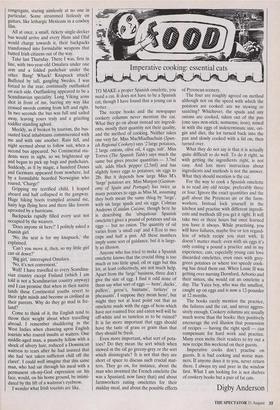Imperative cooking: . essential cats AL,0101 k,„ , •
TO MAKE a proper Spanish omelette, you need a cat. It does not have to be a Spanish cat, though I have found that a young cat is better.
The recipe books and the newspaper cookery columns never mention the cat. What they go on about instead are ingredi- ents, mostly their quantity not their quality, and the method of cooking. Neither takes one very far. Miss MacMiadhachain (Span- ish Regional Cookery) says '2 large potatoes, 2 large onions, olive oil, 4 eggs, salt'. Miss Torres (The Spanish Table) says much the same but gives precise quantities — 3.7m1 salt, adds black pepper (2.5m1) and has slightly fewer eggs to potatoes; six eggs to 21b. But it depends how large Miss M's 'large' potatoes are. Miss Manjon (Gastron- omy of Spain and Portugal) has twice as many potatoes to eggs as Miss M, assuming they both mean the same thing by 'large', with six large spuds and six eggs. Colman Andrews (Catalan Cuisine, though here he is describing the 'ubiquitous' Spanish omelette) gives a pound of potatoes and six eggs — but no onion. The quantity of oil varies from 'a small cup' and 4 fl.oz to two cups and half a pint. All these numbers imply some sort of guidance, but it is large- ly an illusion.
Anyone who has tried to make a Spanish omelette knows that the crucial thing is too much or too little spud, oil or eggs but this ldt, at least collectively, are not much help, Apart from the 'large' business, three don't give the size of egg. I find it odd none of them say what sort of eggs — hens', ducks', pullets', geese's, bantams', turkeys' or pheasants'. I suppose they mean hens', but might they not at least point out that an omelette made with the eggs of hens which have not roamed free and eaten well will be off-white and so tasteless as to be ruined'? It is far more important that eggs should have the taste of grass or grain than that they should be fresh.
Even more important, what sort of pota- toes? Do they mean the sort which when stewed in the oil go greeny-grey or the sort which disintegrate? It is not that they are short of space to discuss such crucial mat- ters. They go on, for instance, about the man who invented the French omelette (he was a Spaniard; now fancy that) and about farmworkers eating omelettes for their midday meal, and about the possible effects of Pyrenean scenery.
The four are roughly agreed on method although not on the speed with which the potatoes are cooked: are we stewing or sautéing? Whichever, the spuds and any onions are cooked, taken out of the pan (one says non-stick; nonsense, iron), mixed in with the eggs of indeterminate size, ori- gin and diet, the lot turned back into the pan and slowly cooked with a lid on, then turned over.
What they do not say is that it is actually quite difficult to do well. To do it right, as with getting the ingredients right, is not easy. And lots more instruction about ingredients and methods is not the answer. What they should mention is the cat.
For the way to cook a Spanish omelette is to read any old recipe, preferably three or four. Ignore the exact quantities and the guff about the Pyrenean air or the farm- workers. Instead lock yourself in the kitchen and practise with different ingredi- ents and methods till you get it right. It will take two or three hours but once learned you have it always. While practising, you will have failures, maybe five or ten regard- less of which recipe you start with. It doesn't matter much: even with six eggs it's only costing a pound a practice and in my experience, cats, especially young cats love discarded omelettes, even ones with grey- green potatoes or where too speedy cook- ing has dried them out. When Louie II was getting over nursing Dornford, Arborio and their sisters, she would eat an omelette a day. The Yates boy, who was the smallest, caught up on eggs and is now a 12-pounder at 12 months.
The books rarely mention the practice, the failures and the cat, and never aggres- sively enough. Cookery columns are usually much worse than the books: they positively encourage the evil illusion that possession of recipes — having the right spell — can compensate for hard work and practice. Many even incite their readers to try out a new recipe this weekend on their guests.
Imperative cooks don't practise on guests. It is bad cooking and worse man- ners. If anyone does it to you, never return there. I always try and peer in the window first. What I am looking for is not shelves of cookery books but a pair of fat cats.
Digby Anderson










































 Previous page
Previous page